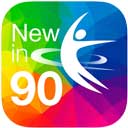Don’t be fooled! Here’s 10 food and drinks to avoid
Whilst our main focus is on lifestyle and habit change (rather than calorie counting) when it comes to health and fitness, we’re always on the lookout for pitfalls that anyone can fall into on a daily basis.
Here are some examples of foods and drinks you should definitely be careful of!
1. Low fat yogurts: These are often marketed as ideal as “part of a calorie controlled diet”, but take the fat out of most yogurts and they become flat and tasteless. To compensate, manufacturers will boost the sugar and artificial flavourings, creating a product that might be low fat but is very high in calories.
Always go for natural or Greek varieties and add your own fruit.
2. Iced tea: Whilst this may seem to be a worthy and refreshing choice on a warm day, most iced tea varieties (including green tea) are crammed full of sugar…and some even exceed the levels found in well known fizzy drinks. As a result, it’s easy to consume your entire recommended daily sugar amount in one go!
Try natural mint tea that’s slightly sweeter to start.
3. Energy bars: Often sold in the “healthy” section of supermarkets and natural health shops, “energy bars” can be deadly and often contain in excess of 500 calories each. Much care is needed when selecting.
Look at the labels and pick one that has less than 250 calories and at least 4g of protein.
4. Prepared salads: How often do you go into a restaurant or take away and order a salad “through gritted teeth” to be healthy whilst your companions have the steak and chips or blt sandwich? Whilst a well constructed salad can be extremely beneficial and tasty, most restaurant chefs or shops flood their salads with extra fats to make them tastier and therefore “worth the money”. Caesar salads are particularly bad because of the oil, Parmesan and deep fried croutons. Make sure you know what’s in a salad before you order or buy…it may be worth picking something else!
Salads can be some of the tastiest dishes out there…so mix plenty of ingredients with only a bit of natural oil (say from tuna fish) and herbs or spices.
5. Hot chocolate: Whilst it is technically possible to have a reasonably healthy hc using a small cup of skimmed milk and only a teaspoon of chocolate (or hot water and maybe two spoonfuls of chocolate), most coffee shop hot chocolates are definite no-go items. The Starbucks Venti 2% Salted Hot Chocolate, for example, will hit you with 760 calories, 22g of fat and 85g of sugar!
Have a fruit tea with a small piece of plain dark chocolate instead.
6. Flavoured waters: A relatively new addition to the shop shelves, these are a sensational marketing gimmick. Often proclaiming to be full of extra vitamins and other energy-giving nutrients, the extra sugar in most of them will far outweigh any benefits given by the former. For instance, one of the best selling varieties, Volvic’s Touch of Fruit, has 27.5g of sugar in a 500ml bottle…equivalent to almost seven teaspoons of sugar. Things get even worse with something like Drench’s blackcurrant and apple water which comes in with a whopping 46g per 500ml. Bottled water is expensive enough without paying extra for added sugar.
Fill up a water bottle each morning from the tap…it’s free and much better for you! Alternatively, make your own “fruit infused” water.
7. Milkshakes: Just no…never.
8. Smoothies: Often sold as great “health” drinks, popular brands have built their reputation as being one (or even two) of the “five-a-day” servings. Don’t be fooled! Because they contain so much fruit, their natural sugar content is far higher than if you just had one of the original fruit. Throw in some tempting milk, cream or ice cream and their health value goes out of the window. Many fruit juices are as bad, advertising themselves as containing “the juice of ten fruit”. Sounds great until you realise you would not sit down and eat ten of any fruit in one go…ever!
Read the label carefully before purchase, or make your own smoothies with some fat free Greek yoghurt, a small handful of fruit and lots of ice.
9. Coleslaw: Packed full of carrot, cabbage and other veg, most pre-packaged coleslaw is an accident waiting to happen. Crammed with salad cream or mayonnaise, an average portion can deliver over 260 calories and 20g of fat.
Make your own using a fat free yogurt, with a squirt of lemon juice and lots of pepper and herbs.
10. Pre-packaged sandwiches: Although many fast food outlets have made a real effort to label their sandwiches and provide low calorie alternatives, it’s still often quite difficult to find one that’s low fat, low calorie and tasty. Many are still made of white bread and are crammed full of mayonnaise or similar. Even the sandwiches that are targeted at “dieters” can contain as much as half the targeted daily intake…and who can make do with just a sandwich at lunchtime?
Go for a wholemeal bread sandwich, containing a lean meat or fish, healthy salad veg with a light dressing. Or instead opt for a soup or egg on toast.
As we’re always saying (boring but true), eating is as much about common sense as it is about micro managing your calorie intake. Read the labels of everything you buy and stick to the basics (e.g. plain water instead of flavoured water), reserving the slightly more “unhealthy” options for those times you may not have the choice.
Good luck!
The New In 90 team

